WE ARE BANGALIES.... we have a lot of celebrations. such as POHELA BAISHAKH.... it is a very gorgious & happiest celebration for all bangalies.....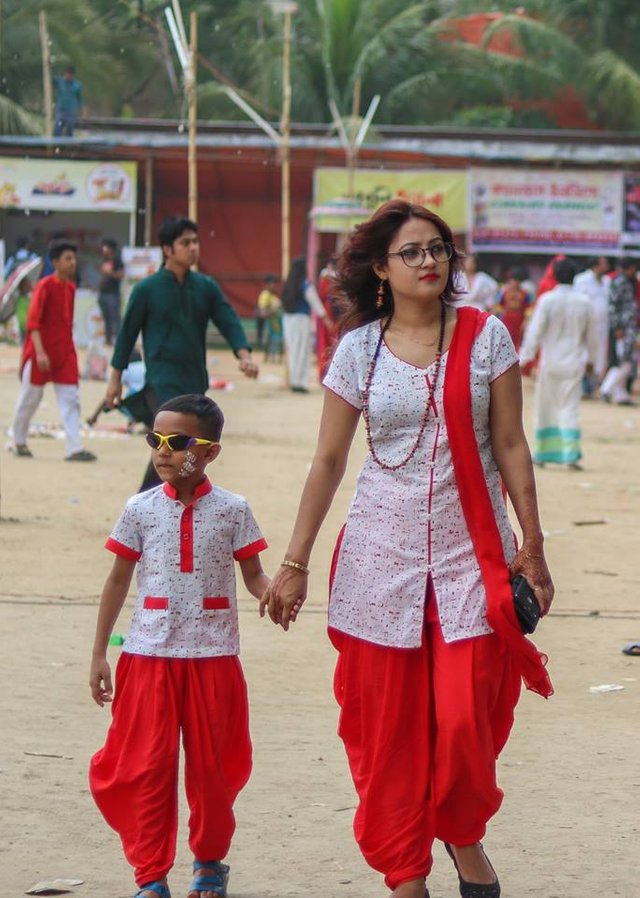 Pahela Baishakh (Bengali: পহেলা বৈশাখ) or Bangla Nababarsha (Bengali: বাংলা নববর্ষ, Bangla Nôbobôrsho) is the first day of Bengali Calendar. It is celebrated on 14 April as a national holiday in Bangladesh, and on 14 or 15 April in the Indian states of West Bengal, Tripura and part of Assam by people of Bengali heritage, irrespective of their religious faith.[5]
Pahela Baishakh (Bengali: পহেলা বৈশাখ) or Bangla Nababarsha (Bengali: বাংলা নববর্ষ, Bangla Nôbobôrsho) is the first day of Bengali Calendar. It is celebrated on 14 April as a national holiday in Bangladesh, and on 14 or 15 April in the Indian states of West Bengal, Tripura and part of Assam by people of Bengali heritage, irrespective of their religious faith.[5]
The festival date is set according to the lunisolar Bengali calendar as the first day of its first month Baishakh.[6] It therefore almost always falls on or about 14 April every year on the Gregorian calendar.[6] The same day is observed elsewhere as the traditional solar new year and a harvest festival by Hindus and Sikhs, and is known by other names such as Vaisakhi in central and north India, Vishu in Kerala and Puthandu in Tamil Nadu.[2][3][4]
The festival is celebrated with processions, fairs and family time. The traditional greeting for Bengali New Year is শুভ নববর্ষ "Shubho Nabobarsho" which is literally "Happy New Year". The festive Mangal Shobhajatra is organized in Bangladesh. In 2016, the UNESCO declared this festivity organized by the Dhaka University as a cultural heritage of humanity............
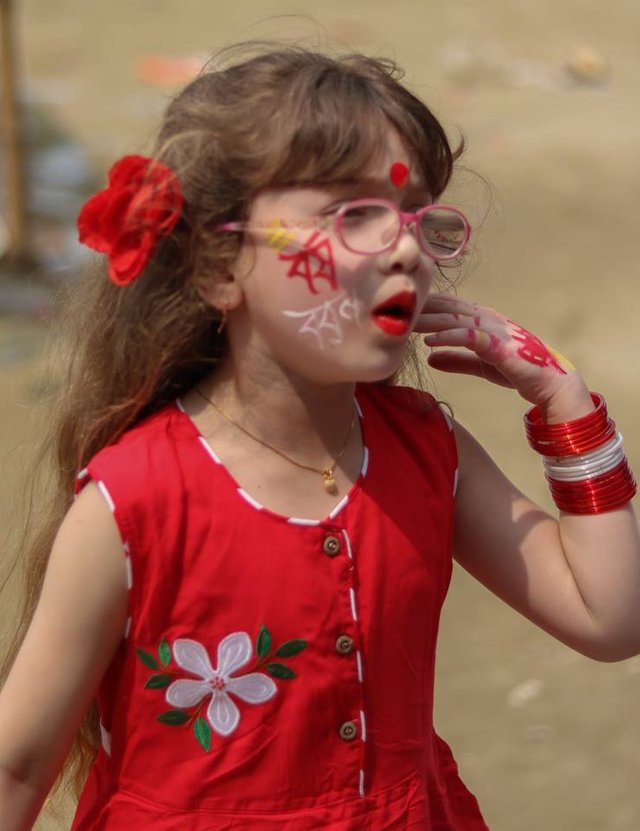
During the Mughal rule, land taxes were collected from Bengali people according to the Islamic Hijri calendar. This calendar was a lunar calendar, and its new year did not coincide with the solar agricultural cycles. According to some sources, the festival was a tradition introduced in Bengal during the rule of Mughal Emperor Akbar to time the tax year to the harvest, and the Bangla year was therewith called Bangabda. Akbar asked the royal astronomer Fathullah Shirazi to create a new calendar by combining the lunar Islamic calendar and solar Hindu calendar already in use, and this was known as Fasholi shan (harvest calendar). According to some historians, this started the Bengali calendar.[8][9] According to Shamsuzzaman Khan, it could be Nawab Murshid Quli Khan, a Mughal governor, who first used the tradition of Punyaho as "a day for ceremonial land tax collection", and used Akbar's fiscal policy to start the Bangla calendar.[10]
According to Shamsuzzaman Khan,[10] and Nitish Sengupta, the origin of the Bengali calendar is unclear.[11] According to Shamsuzzaman, "it is called Bangla san or saal, which are Arabic and Parsee words respectively, suggests that it was introduced by a Muslim king or sultan."[10] In contrast, according to Sengupta, its traditional name is Bangabda.[11][12]
Some historians attribute the Bengali calendar to the 7th century king Shashanka.[10][11] The term Bangabda (Bangla year) is found too in two Shiva temples many centuries older than Akbar era, suggesting that Bengali calendar existed before Akbar's time.[11] It is also unclear, whether it was adopted by Hussain Shah or Akbar. The tradition to use the Bengali calendar may have been started by Hussain Shah before Akbar.[11] Regardless of who adopted the Bengali calendar and the new year, states Sengupta, it helped collect land taxes after the spring harvest based on traditional Bengali calendar, because the Islamic Hijri calendar created administrative difficulties in setting the collection date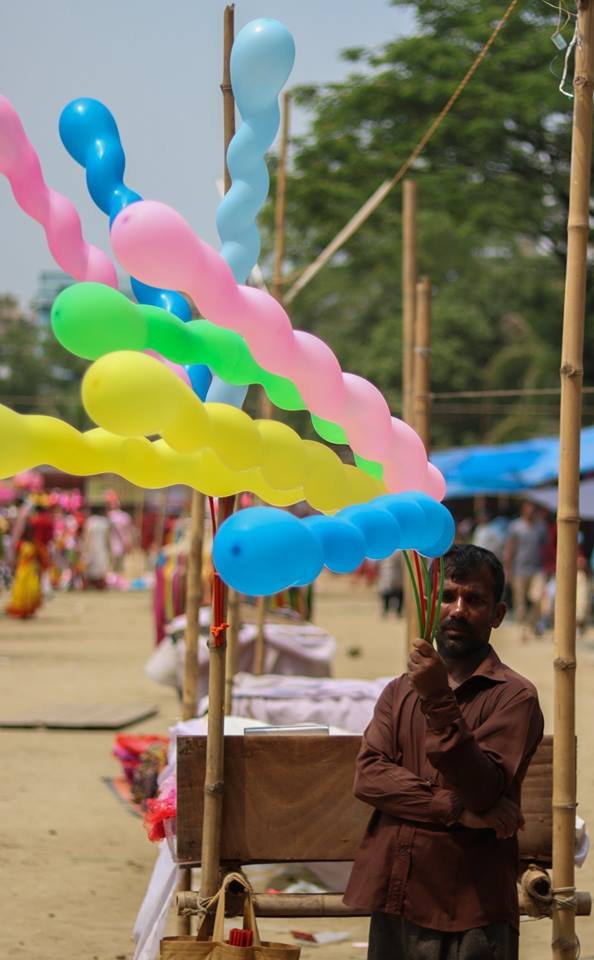
Pahela Falgun (Bengali: পহেলা ফাল্গুনPôhela Falgun or পয়লা ফাল্গুন Pôela Falgun), first day of Spring of Bengali month Falgun, of the Bengali calendar, celebrated in Bangladesh[1] it was started in 1991 by students of Dhaka University's Faculty of Fine Arts.[2] The first of Falgun usually falls on 13 February of the Gregorian Calendar.[3] This day is marked with colourful celebration and traditionally, women wear yellow saris to celebrate this day. This celebration is also known as Basanta Utsab (Bengali: বসন্ত উৎসব; Spring Festival).
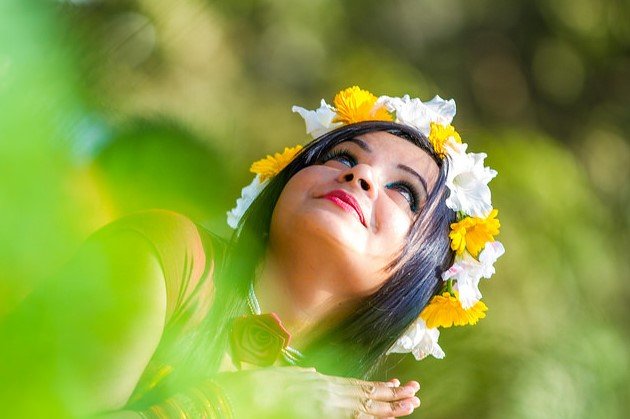
Everything in nature gives a feeling of youthfulness or brightness. We can assume it as a new birth of the nature. Pohela Falgun is the first day of spring in the Bengali month of Falgun at Bangladesh. This season is the king of all seasons of Bangladesh. Pohela means that first and Falgun is eleventh month of Bengali calendar. It is being celebrated with flowers, songs, poems and dances. It takes joys and colors both in life and nature.
After the winter season the dryness being reduces. The new green leaves of trees start to come out again. The nature decorates with the branches and new colorful flowers such as Polash, Marigold and Shimul. Particularly the “Krishnachura” carries the news of spring first with red color.
Pohela Falgun is celebrated in Bangladesh and West Bengal, Assam, Jharkhand, Tripura and Orrisa in India. The first of Falgun usually plunges on 13th February. This day is marked with colorful festivity and traditionally. Women wear yellow saris called bashonti sari to celebrate this day with great enjoyment. This Bengali festival is known as Bosonto Utsob. Mind blowing tune of birds and colorful flowers give a mild touch of the sunshine. As well as everything of these make people feel that the springtime is nature’s festival.
The festival-loving Bangladeshi people welcome and celebrate this day with great joy, love and in a colorful manner. The glowing red and yellow are the envoy colors of Pohela Falgun. Bengalis are blown up themselves with these two primary colors. Girls are dressed in saris and boys wear colorful panjabis to greeting the arrival of spring.
People gather at Bakultola of the Faculty of Fine Arts of Dhaka University to celebrate this day. It is the centre point of this festival. Thousands of men and women gather in the morning and celebrate. The entire Dhaka University campus and the Ekeushy Boi mela grounds become the best location to hang out with family members, friends and beloved ones.
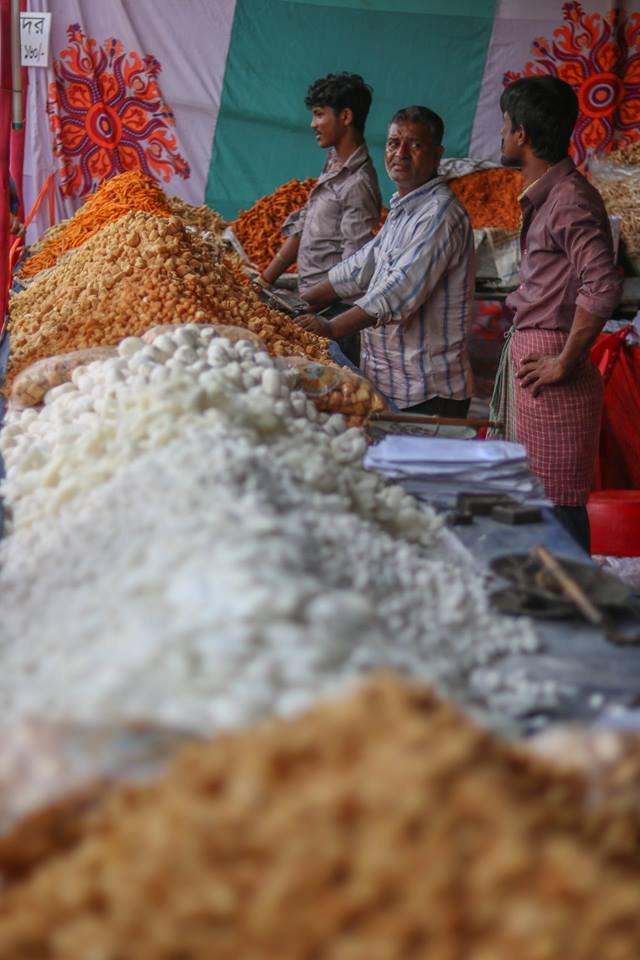
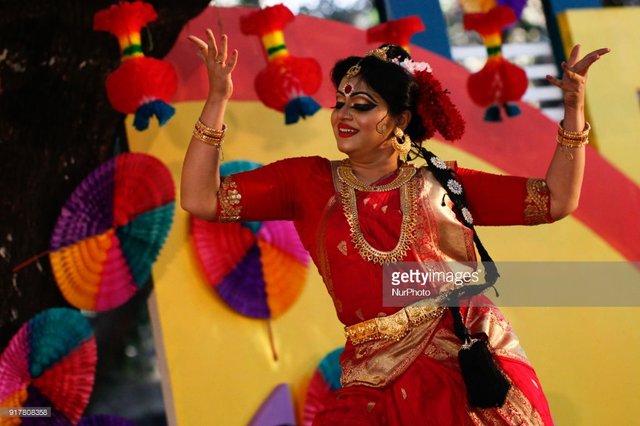
Muslim
Eid ul-Fitr - on the 1st day of Shawwal month of the lunar Islamic calendar.[1]
Eid ul-Adha - on the 10th day of Dhu al-Hijjah month of the Islamic calendar.[2]
Chaand Raat - on the 29th or 30th night of Ramadan month of the Islamic calendar.[3]
Ashura - on the 10th day of Muharram in the Islamic calendar.[4]
Eid-e-Meeladun Nabi – The Birth of the Prophet[5]
Shab-e-Qadr[6]
Shab-e-Baraat[7]
Bishwa Ijtema[8]
Hindu
Durga Puja - from the 2nd to the 7th day of Kartik month of the Bengali calendar.[9]
Krishna Janmashtami - celebration of the birth of the Hindu deity Krishna[10]
Dolyatra[11]
Rathayatra, the most popular being Dhamrai Rathayatra.[1]
Kali Puja[12]
Saraswati Puja[13]
Buddhist
Buddha Purnima - Buddha's Birthday[14]
Madhu Purnima[15]
Kathin Chibardan - offering of woven robe made of cotton to monks and nuns.[16]
Christian
Boro Din or Christmas - on 25 December of the Gregorian calendar.[17]
Easter Sunday[18]
Patriotic and National Observances
Language Movement Day - (International Mother Language Day); Wearing colour: [19]
Genocide Remembrance Day
Independence Day; Wearing colour: [20]
Armed Forces Day[21]
Martyred Intellectuals Day[22]
Victory Day; Wearing colour: [23]
Cultural festivals
Celebrations of Pahela Baishakh at Dhaka
Bangladeshi girls taking Selfie at Pahela Falgun festival.
General
Rokeya Day
Rabindra Jayanti
Nazrul Jayanti
Music
Dhaka World Music Festival (music)[24]
Bengal Classical Music Festival[25]
Folk
Pahela Baishakh - on the 1st day of the Bengali calendar and summer festival; Wearing colour: [26]
Basanta Utsab - Spring festival; Wearing colour: [27]
Nabanna - Winter and harvest festival; Wearing colour: [28]
Barsha Mangal - Monsoon festival; Wearing colour:
Others
Dhaka Art Summit[29]
Hay Festival Dhaka[30]
Dhaka Fashion Week[31]
Dhaka International Film Festival[32]
Chobi Mela International Photography Festival[33]
Fairs
Ekushey Book Fair in Dhaka
Ekushey Book Fair - in Dhaka on the month of February of the Gregorian calendar.[34]
Dhaka International Trade Fair[35]
National Tree Fair - Month-long National Tree Plantation Campaign and Tree Fair.
Local events
Shakrain kite festival, Dhaka
Shakrain - in Dhaka at the end of the Poush of the Bengali calendar.[36]
Jatiya Pitha Utsab - National Pitha (Cake) Festival.[37]
Joy Bangla Concert - annual concert to mark the 7th March Speech of Bangabandhu Sheikh Mujib.
Nouka Baich[38]
Bisu Mela
THANKS FOR WATCHING .................................................